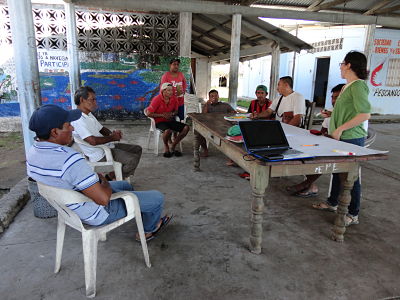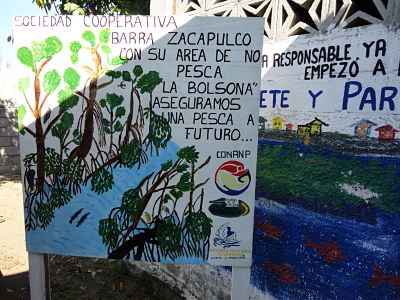


Levels of community self-organization have been improved within fishing communities by strengthening their various capacities needed to define and self-regulate policies on sustainable fishing. This was done by:
-training on: fishing catch limits and productivity possibilities, how resources and fishing are interlinked;
- In the field, mentoring by NGOs on how fishermen can make group decisions and effectively plan the zonification of ecosystems into conservation and fishing/productive areas;
- Involvement of the fishermen’s wives and children in awareness-raising activities, leading to a strengthening of the learning process within families.
This has led to social cohesion within the zone, allowing the fishing cooperatives to negotiate and regulate amongst themselves to agree and enforce best practices for sustainable fishing; and increasing their capacity to find direct markets for their products, without the need for intermediaries. Being able to self-organize to the point of coming up with and implementing their own sustainable fishing solutions, made the communities owners of those solutions, which means the latter will be more likely to be maintained into the future.
- A network of NGOs experienced enough to be able to provide mentoring in the field to the fishermen;
- excellent teaching materials and methods appropriate to the communities;
- commitment of wives and children to the whole process;
- existing levels of organization upon which to build (e.g. fishing cooperatives);
- a shared sense of identity and belonging between the fishing cooperatives;
- an existing sense of pride and entrepreneurship in the local communities.
- It is of vital importance to make use of existing cooperatives to generate, lead and manage new techniques and regulations in the existing productive activities.
- People are more willing to get involved and practice self-organized initiatives for sustainable management when they perceive quick improvements in their productive activities related to the nurturing and rehabilitation of mangroves.
- Therefore, monitoring any benefits derived from initiatives is important.
- Inclusion of all family members in the process of developing self-organization skills and capacitation.
- Good management of the NGO network necessary for capacity development is essential.
- Enough resources should be available to continue working on the nurturing of the fishermen’s organizational capabilities up to the point where they are self-organizing.